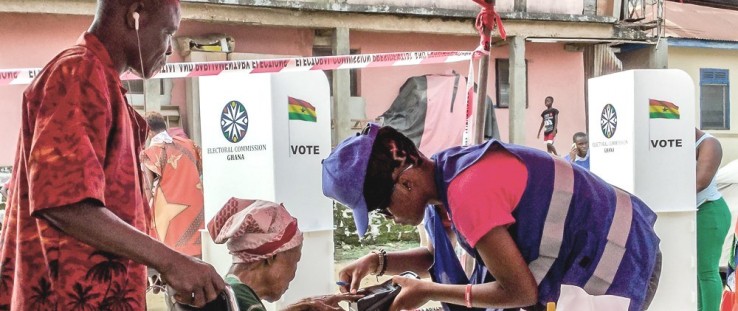 A 90-year-old woman is biometrically verified to vote on Election Day in Ghana.
USAID
A 90-year-old woman is biometrically verified to vote on Election Day in Ghana.
USAID
 A 90-year-old woman is biometrically verified to vote on Election Day in Ghana.
USAID
A 90-year-old woman is biometrically verified to vote on Election Day in Ghana.
USAID
Throughout Ghana last December, thousands of Ghanaians sang, danced and cheered in the streets. Ostensibly, they were celebrating New Patriotic Party (NPP) candidate Nana Akufo-Addo’s victory over National Democratic Congress (NDC) candidate and incumbent President John Mahama in the country’s Dec. 7 general election, but the victory went deeper than that. Ghanaians of all political persuasions were jubilant that their elections were free, fair, transparent, inclusive and peaceful—and that they resulted in a peaceful transition of power.
NDC supporter Eric Nortey told GhanaWeb, “This victory should not only be for NPP. We all won the elections together.” Ghanaian twitter user @Tuffour summed up the national sentiment when he tweeted, “It is a blessing to have a country that chooses its leaders through ballot, not bullet. Congrats to both @NAkufoAddo and @JDMahama #Ghanawins.”
Ghana, the first sub-Saharan African country to gain independence from colonial rule in 1957, is widely considered to be a beacon of democracy and stability in the region. The country only became a multiparty democracy in 1992; the previous years were marked by political instability, including several military coups.
“Ghana has shown remarkable progress in the past 25 years. The December 2016 election was the seventh consecutive election that was largely free, fair and peaceful,” said USAID/Ghana Mission Director Andrew Karas.
Karas said USAID/Ghana took advantage of its broad and deep partnerships to support Ghanaians in administering this successful election. “For more than 50 years, USAID has been working with the Ghanaian Government, civil society and other partners to strengthen democratic processes, and these partnerships were a great asset,” he said.
Partnering for Transparency
Ahead of the election, a primary goal of USAID and Ghanaian leaders was increasing trust in the Electoral Commission, the official body responsible for the administration of Ghanaian elections.
Although the last presidential election in 2012 was deemed largely free and fair by observers, it was beset by several logistical issues and irregularities. Mahama’s NDC party won that election with 50.7 percent of the vote—just a few thousand votes over the threshold to preclude a run-off election. The NPP subsequently sued the Electoral Commission in a case that went to the Supreme Court.
Trust in the Electoral Commission plummeted. In a poll conducted by the Center for Democratic Development, an independent Ghanaian NGO and USAID partner, half a year before the election, only 58 percent of respondents said they felt the commission was prepared to administer the elections fairly and impartially.
USAID partnered with the Electoral Commission to boost its credibility, pushing greater collaboration with civil society and new ways to communicate with voters.
The Electoral Commission threw its weight behind this strategy. “The communication strategy is the blueprint of how we intend to effectively communicate in order to deliver on our core electoral mandate,” said Electoral Commission Chair Charlotte Osei. “It comes at a time when we have purposed to improve our relationship with our key stakeholders and reposition the commission as a lawful, transparent and responsive institution.”
The commission trained more than 600 officials on strategic communication and more than 100,000 political party polling agents to improve transparency and accountability. It launched a redesigned website, which received more than 20,000 hits the day it went live. The commission even produced a live television show, #AskTheEC, during which voter questions were answered.
These efforts paid off. Two months before the election, more than 73 percent of Ghanaians surveyed in a second Center for Democratic Development poll said they felt the commission was prepared to administer the elections fairly—an increase of more than 25 percent.
Public opinion of the Electoral Commission soared even higher after the election. Ghanaian celebrities, clerics and influencers heaped praise upon the Electoral Commission. Osei, the first female chair of the commission, has emerged as a national feminist icon.
Mobilizing for Peace
Many Ghanaians and international observers alike feared election-related violence—the elections were competitive and the stakes were high.
USAID worked with a number of partners to flood the airwaves with messages promoting peace and train community leaders and journalists on peace messaging. These radio, television and social media messages featured songs, cartoons and heartfelt testimonials from youth, celebrities, traditional leaders and members of the clergy on why a peaceful Ghana was so important.
Bishop James Kweku Saah, a member of Ghana’s National Peace Council—an autonomous body that mediates conflicts between villages, individuals and others—said in one video, “I encourage every man, every woman, every boy, every girl to participate in elections with a heart of peace in the greater interest of our nation.” In another testimonial, Sarafina Kini, a student, said simply, “Let’s put Ghana first because we only have one Ghana.”
USAID teamed up with the West African Network for Peacebuilding to employ a network of civil society and community members to monitor potential triggers before, on and after Election Day, and report them through a countrywide early warning system.
Early warning and response groups consisting of influential community members such as traditional chiefs and queen mothers, scholars and Peace Council members; and religious leaders such as priests and imams would then respond directly to these triggers. USAID and its partners helped form these groups in each region as well as one national-level group that was presided over by National Peace Council Director Emmanuel Asante.
Asante said USAID’s support was critical to the peaceful elections. “This is the first time that the National Peace Council of Ghana worked together with civil society and state institutions to jointly develop a strategic approach that mitigated electoral violence triggers and supported the political environment to ensure peace before, during and after the 2016 elections,” he said. “The efforts of these groups contributed immensely not only to the success of the general election in Ghana, but also to the peaceful transition of power from the ruling party to the opposition.”
Election Day and Beyond
All these preparations led up to Dec. 7, Election Day. USAID and the Embassy of the Netherlands helped deploy more than 7,000 domestic observers to all 29,000 polling stations in Ghana in partnership with the Ghana Coalition of Domestic Election Observers (CODEO). These observers were recruited from a number of Ghanaian organizations, including religious institutions, universities and civil society. In addition, the U.S. Embassy deployed 50 teams of international observers to polling stations throughout the country.
Finally, USAID supported CODEO to conduct a parallel vote tabulation, in which they counted the votes at each polling station independently of the Electoral Commission in order to authenticate the final tally. This exercise was a success, with CODEO’s final tally matching almost exactly that of the Electoral Commission.
Joy Searcie, director of USAID/Ghana’s Office of Democracy, Rights and Governance and a member of one of the international observer teams, said it was gratifying to see the fruits of USAID’s work on Election Day.
“It was a long night, but on Dec. 7, I witnessed a turning point in Ghana’s history. The people elected a new president and rose above any prediction of violence by heading to the polls in peace and participating in a free, fair and transparent process,” she said. “I was so grateful for the opportunity to witness firsthand the impact of our work to facilitate a successful democratic transition.”








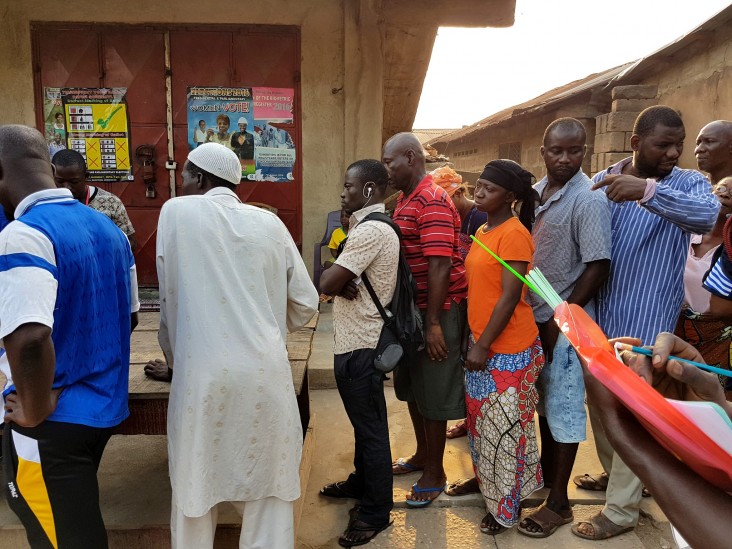
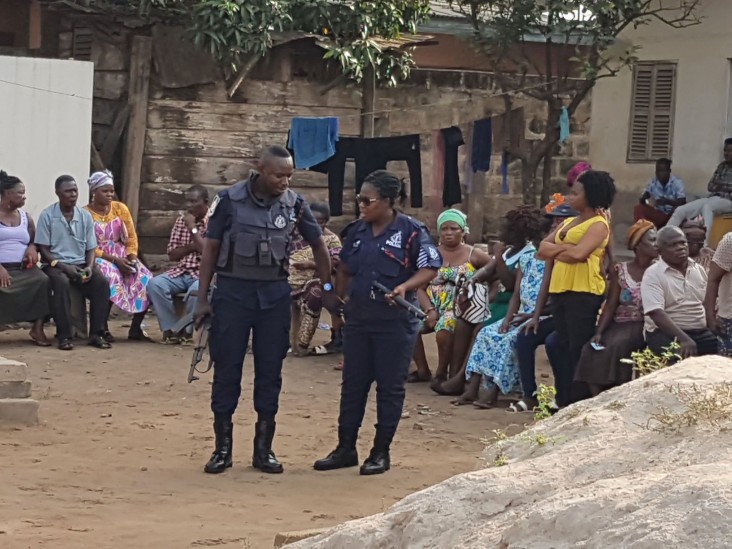
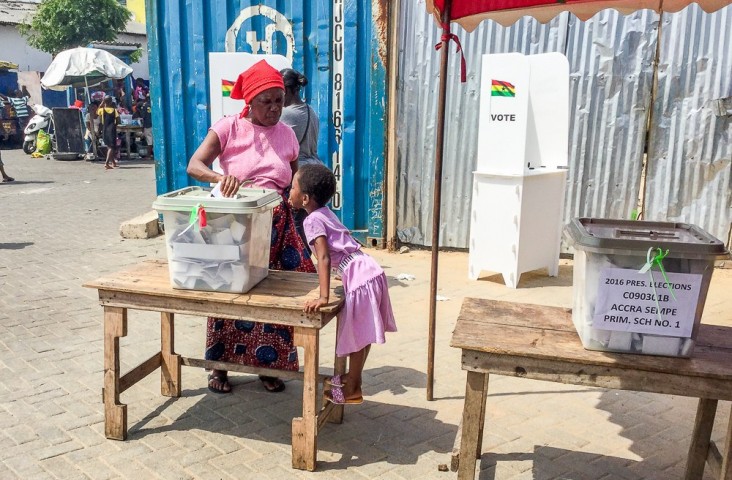
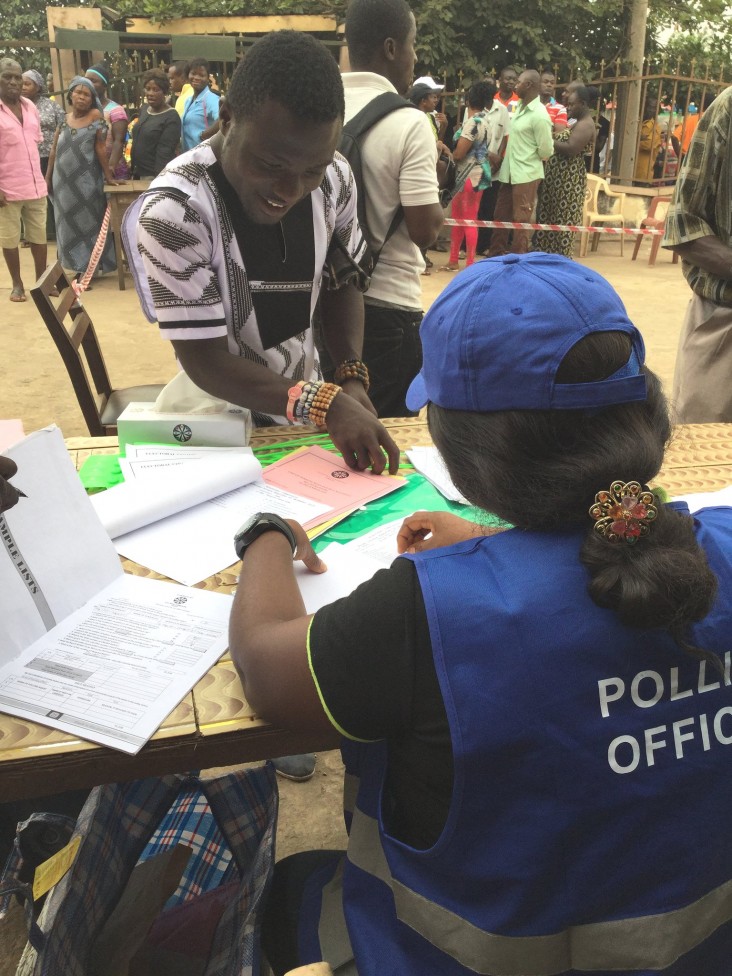
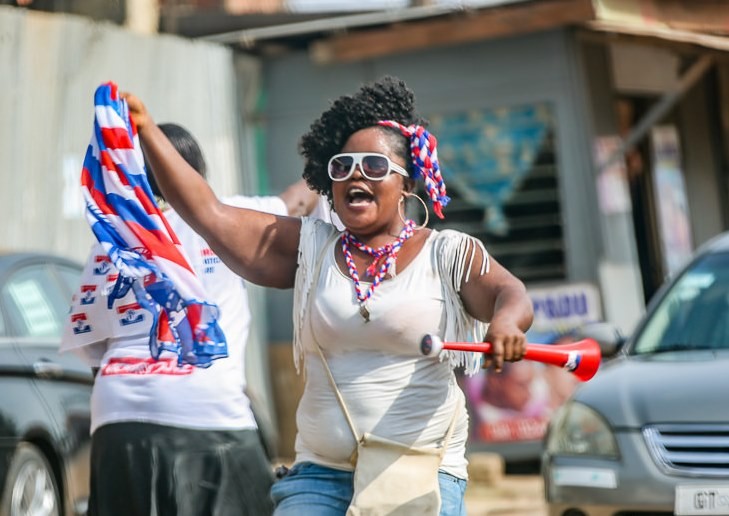
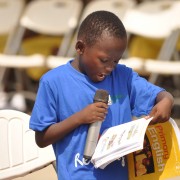
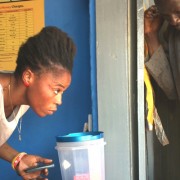
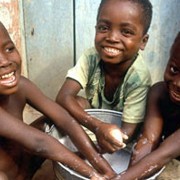
Comment
Make a general inquiry or suggest an improvement.